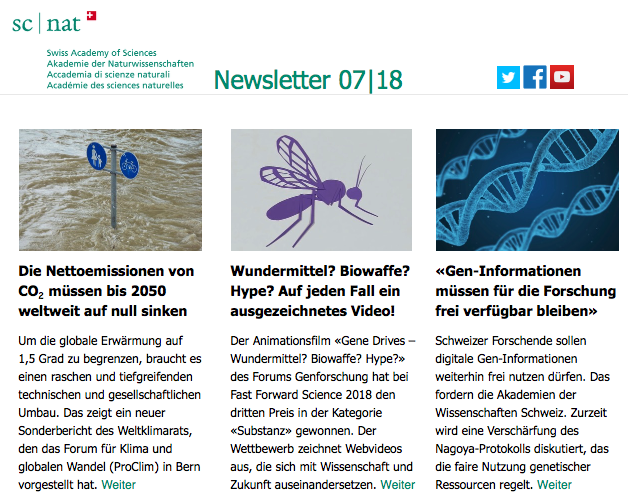Webinar: Capturing value from your data to accelerate innovation
Join us on 13 November, 12.00h, and learn how to increase speed to market with cutting edge data science methods for R&D and manufacturing.
Most chemical companies have more potential projects than they have time to work on. Fulfilling customer requirements as quickly as possible is key to capturing value from the market. This webinar will explain how you can accelerate innovation in new process and product development.
By attending this webinar, you will learn:
- Why developing new technologies in cutting edge industries is such a challenge
- Why design of experiments is critical if you want confidence in meeting development project milestones
- How you can extract valuable insight from your flood of manufacturing data
Speakers:
- Stan Higgins, OBE, former CEO of the North East of England Process Industries Cluster
- Phil Kay, JMP Senior Analytics Consultant, SAS JMP
Moderator: Benjamin Valsler, Digital Editor, Chemistry World magazine
More details about the content of the webinar and the speakers as well as the registration link are available via the direct link.
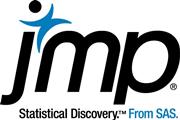 JMP has been a part of SAS since the first version of JMP statistical discovery software was launched in 1989, bringing interactive data visualization and analysis to the desktop. SAS is the leader in business analytics software and services, and the largest independent vendor in the business intelligence market. Through innovative solutions, SAS helps customers at more than 60,000 sites improve performance and deliver value by making better decisions faster. Since 1976 SAS has been giving customers around the world THE POWER TO KNOW®
JMP has been a part of SAS since the first version of JMP statistical discovery software was launched in 1989, bringing interactive data visualization and analysis to the desktop. SAS is the leader in business analytics software and services, and the largest independent vendor in the business intelligence market. Through innovative solutions, SAS helps customers at more than 60,000 sites improve performance and deliver value by making better decisions faster. Since 1976 SAS has been giving customers around the world THE POWER TO KNOW®
David Spichiger, SCS
05.11.2018
SCNAT Newsletter, Oktober 2018
Die Nettoemissionen von CO₂ müssen bis 2050 weltweit auf null sinken
Um die globale Erwärmung auf 1,5 Grad zu begrenzen, braucht es einen raschen und tiefgreifenden technischen und gesellschaftlichen Umbau. Das zeigt ein neuer Sonderbericht des Weltklimarats, den das Forum für Klima und globalen Wandel (ProClim) in Bern vorgestellt hat. Weiter
Wundermittel? Biowaffe? Hype? Auf jeden Fall ein ausgezeichnetes Video!
Der Animationsfilm «Gene Drives – Wundermittel? Biowaffe? Hype?» des Forums Genforschung hat bei Fast Forward Science 2018 den dritten Preis in der Kategorie «Substanz» gewonnen. Der Wettbewerb zeichnet Webvideos aus, die sich mit Wissenschaft und Zukunft auseinandersetzen. Weiter
«Gen-Informationen müssen für die Forschung frei verfügbar bleiben»
Schweizer Forschende sollen digitale Gen-Informationen weiterhin frei nutzen dürfen. Das fordern die Akademien der Wissenschaften Schweiz. Zurzeit wird eine Verschärfung des Nagoya-Protokolls diskutiert, das die faire Nutzung genetischer Ressourcen regelt. Weiter
Ein Jahr der Extreme für Schweizer Gletscher?
Im Hitzesommer 2018 verzeichneten die Gletscher massive Verluste. Ohne die riesigen Winter-Schneemengen wäre die Schmelze noch viel dramatischer ausgefallen. Mit einer Häufung von Extremjahren haben die Schweizer Gletscher in den vergangenen zehn Jahren einen Fünftel ihres Volumens verloren, berichtet die Expertenkommission für Kryosphärenmessnetze der SCNAT. Weiter
Geoengineering: Emissionen rückgängig machen oder die Sonneneinstrahlung
verändern?Um die globalen Klimaziele zu erreichen, sind technische Massnahmen nötig. Solche Eingriffe ins Klimasystem, als Geoengineering oder Klimaintervention bezeichnet, sind aber mit kaum abschätzbaren Kosten und Risiken sowie mit unerwünschten Nebenwirkungen verbunden. Ein Faktenblatt der Akademien der Wissenschaften Schweiz stellt die verschiedenen Verfahren und ihre Vor- und Nachteile vor. Weiter
Lieber solide wissenschaftliche Ergebnisse als viele
Das Wissenschaftssystem wächst, denn Produktivität wird belohnt. Was in der Wirtschaft sinnvoll sein kann, führt in der Wissenschaft zu Fehlanreizen. Die Qualität wissenschaftlicher Ergebnisse kann teils nicht mehr ausreichend gesichert werden. In Zeiten von Fake News darf das Vertrauen in die Wissenschaft aber nicht gefährdet werden. Die Schweizerische Akademie der Geistes- und Sozialwissenschaften und die Akademie der Naturwissenschaften plädieren in einer neuen Publikation für Qualität vor Quantität. Weiter
Beyond impact factor, h-Index and university rankings: Evaluate science in moremeaningful ways
Scientists and scientific institutions increasingly compete for limited employment opportunities and research funding. The ambition to allocate the available means favoured quantitative metrics to assess the scientific merit. However, these measurements potentially undermine the quality in science. A conference held on 21 November 2018 in Bern shows the limitations of such metrics. It presents assessment approaches that challenge conventional metrics and discusses whether steps are necessary to maintain the high quality of the Swiss science landscape long-term. More
Neu bei der SCNAT: Ursula Schüpbach und Marc Türler
Seit dem Oktober 2018 leitet die Geografin Ursula Schüpbach die Interakademische Kommission Alpenforschung (ICAS) und die Forschungskommission des Schweizerischen Nationalparks (FOK). Sie folgt auf Thomas Scheurer, der pensioniert wurde (Interview). Gleichzeitig hat der Physiker Marc Türler die Leitung der Plattform «Mathematics, Astronomy and Physics» (MAP) von Christian Preiswerk übernommen. Die MAP umfasst verschiedene Fachgesellschaften und Arbeitsgruppen. Sie unterstützt unter anderem die Tätigkeiten dieser Organisationen und fördert die Forschung und Bildung im Bereich Mathematik, Astronomie und Physik.
Herausragende Leistungen bei der Erforschung des Klimawandels
Reto Knutti, Präsident des Forums für Klima und globalen Wandel (ProClim) der SCNAT und Professor für Klimaphysik an der ETH Zürich, wird für seine Leistungen bei der Erforschung des Klimawandels und für die Vermittlung seiner Erkenntnisse an die Öffentlichkeit mit dem Brandenberger-Preis 2018 ausgezeichnet. Der mit 200'000 Franken dotierte Preis zählt zu den höchsten Stiftungspreisen in der Schweiz. Weiter
Wilder Westen im Untergrund
Geothermie, Metroröhren, Leitungen – unter der Erde nimmt das Gedränge zu. Durch die vielfache Nutzung des Untergrunds stellen sich neue Fragen: Wem gehört er eigentlich? Welche Prioritäten sind zu setzen? Bisher hat die Schweiz diese Aspekte noch kaum geregelt. Die laufende Revision des Raumplanungsgesetzes sieht nun vor, den Geltungsbereich auf das Erdreich auszudehnen. Mehr dazu lesen Sie in der aktuellen Ausgabe des Wissenschaftsmagazins «Horizonte». Weiter
«My fear is that the tasks are underestimated severely by open data advocates»
On the national and the international level science is pushing towards open data. As noble as the principle is, the challenges for scientists are immense. Nicolas Thomas, space scientist from the University of Bern, will talk at the event «Open Data and Data Management – Issues and Challenges» on 29 October organised by SCNAT in Bern. The workshop will discuss open questions related to the implementation of the open data concept in Swiss science with representatives from all relevant funding organizations. More
Think Tanks: Rolle und Einfluss in der Schweizer Politik
Denkfabriken liefern wichtige Impulse zu gesellschaftlichen Fragen und beeinflussen die politische Debatte. An einer Tagung der Stiftung Wissenschaftliche Politikstipendien werden ihre Rolle und ihr Einfluss diskutiert sowie die Chancen, die eine Ausbreitung politiknaher Denkfabriken für ein wissenschaftlich informiertes Policy Making mit sich bringen. Melden Sie sich bis zum 24. Oktober an. Weiter
Weitere Aktivitäten der SCNAT
Akademie der Naturwissenschaften Schweiz (SCNAT)
Haus der Akademien | Laupenstrasse 7 | 3008 Bern
Andres Jordi | Tel. 031 306 93 23 | www.scnat.ch
Fragen und Anregungen:
Dr. Thibaud Rossel received the Balmer Prize 2018
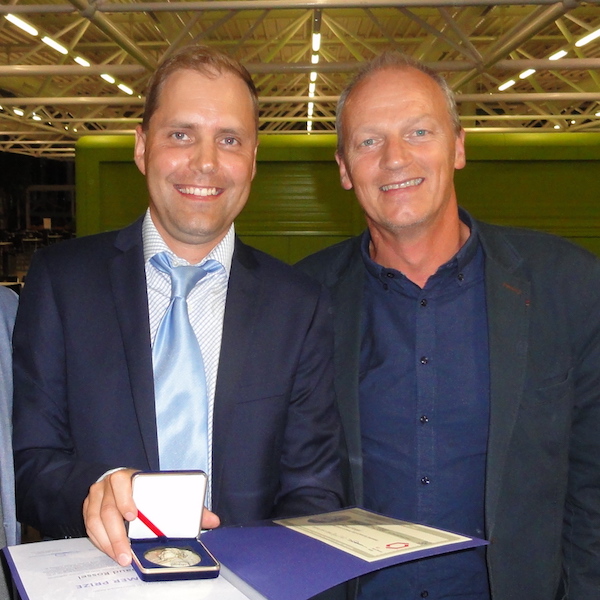 On the occasion of the dinner during the VSN Zentralkurs Chemie in Solothurn on October 17, 2018, David Spichiger, SCS Executive Director, handed over the medal and the certificate of the Balmer Prize 2018 to
On the occasion of the dinner during the VSN Zentralkurs Chemie in Solothurn on October 17, 2018, David Spichiger, SCS Executive Director, handed over the medal and the certificate of the Balmer Prize 2018 to
Dr. Thibaud Rossel,
Gymnase français de Bienne, École de Maturité, Spécialisée,
for his very original and impressive research program at the Gymnase Français where he teaches, using simple methods and resources and, even more impressively, the experiments are shared with high-school students, who are happy to carry-out original research work as part of their training in chemistry.
Thibaud earned his bachelor and master degrees in biology at Uni Neuchâtel in 2004 and 2006 respectively. From 2006 to 2011 he was a member of the Ward group at University of Basel and got the PhD degree for his research on 'Artificial Phosphate Transferases and Hydrogen Transferases Based on Biotin-Streptavidin Technology'. During his teaching activities at the Lycée Denis-de-Rougemont Neuchâtel in 2012-13 he earned an master of advanced studies in higher education and started his current position at the Gymnase français de Bienne filière MSp in 2013.
To illustrate the importance and innovation of Thubaud's project, Dr. Marc Creus, University of Basel, who work together with Thibaud during his PdD thesis highlighted his work as follows: «In my opinion, it is a real pity that normally students do not have the opportunity to experience the excitement of real science early-on. Therefore, the “Chimie en Couleurs” program that Thibaud has designed and implemented is a truly pioneering and successful program that should be further encouraged.»
We like to take the opportunity again to congratulate Thibaud for winning the Balmer Prize 2018.
Picture: Thibaud Rossel and Pierre-Etienne Zürcher, rector of the Gymnase français de Bienne
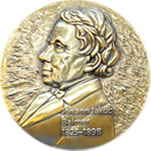 Balmer Prize
Balmer Prize
Medal CHF 2'000 for individuals and CHF 2'000 for the school’s chemistry department and medal in bronze
The Balmer Prize is awarded for innovation in chemistry teaching to a teacher working in Switzerland or to a team of teachers working at the same school at the high school level.
The innovation must consist of an original didactic approach, experimental method or teaching practice and be readily applicable to everyday teaching at the high school level. The costs for materials must be modest.
David Spichiger, SCS
25.10.2018
Call for Inputs for the ECC8 in Lisbon 2020
To: EuCheMS Member Societies, EuCheMS Divisions, Working Parties and EYCN, EuCheMS Executive Board
Dear Colleague,
As chair of the Scientific Committee of ECC8 (Lisbon, 2020) it is my pleasure to contact you to provide key information on the event, and to ask your thoughts and proposals for some matters of the conference. As you may know, ECC8 will take place in Lisbon (Lisbon Congress Center), from August 30 to September 3, 2020.
ECC8 will be built under the unifying theme of Chemistry the Central Science, providing an exciting scientific program led by world class experts, and will focus on the central role of chemistry at the interfaces with biology, material and environmental sciences, both for the progress of humankind and for the solution of fundamental problems of modern societies. The program will reflect the best research done in Europe and its world impact. A balance with respect to all forms of diversity will of course be a guiding principle in the choice of speakers. Young researchers will be supported both in financial terms as well as with respect to presentation opportunities.
Our proposal for the ECC8 scientific themes are:
- Advances in Synthetic Organic Methodologies
- Metal-Containing Compounds and Solids: Properties and Applications
- Chemistry Meets Biology
- Colloids and Nanomaterials
- Biomaterials and Medicinal Chemistry
- Catalysis -Spectroscopic and Analytical Tools / Advances in Physical Chemistry
The list of proposed sub-themes are provisionally shown in the table. We would be most grateful on your thoughts about them, including new proposals, and also how you think they fit within the general themes (please use the table).
A new feature of ECC8 are the three Transversal themes, bringing together different areas with implications in common topics: -Imaging and Devices -Energy and Sustainability -Molecules in Motion
The themes (and subthemes) will run in parallel sessions in the morning, whereas the transversal themes will occupy the afternoons (one per day) in sessions common to all participants (see table used above).
Any other thoughts and suggestions, including possible plenary lecturers, possible special activities, sponsors, are welcome. Feedback form.
Please reply not later than December 7/2018.
After setting the sub-themes, the Scientific Committee will choose the respective convenors and the invited speakers.
The ECC8 Scientific Committee members are: Luisa De Cola – Chair (Univ. Strasbourg, France) Mário Berberan-Santos – Co-Chair (Univ. Lisbon, Portugal) Artur M. S. Silva – Portuguese Chemical Society (Univ. Aveiro, Portugal)
Alice Soldà (European Young Chemists´ Network – Technical Univ. Munich, Germany) Katharina M. Fromm (Univ. Fribourg, Switzerland) Piotr Stepnowski (Univ. Gdansk, Poland) Paolo Melchiorre (ICIQ, Tarragona, Spain) Roland Winter (Technical Univ. Dortmund) Rene Janssen (Univ. Eindhoven, Netherlands) Oren Scherman (Univ. Cambridge, UK) John Cassidy (Dublin Institute of Technology, Ireland) Maria Lucia Curri (Univ Bari, Italy)
Looking forward to receiving your important contributions, I remain
Luisa De Cola Professor
University of Strasbourg, France
David Spichiger, SCS
24.10.2018
ChemPubSoc Europe News, October 2018
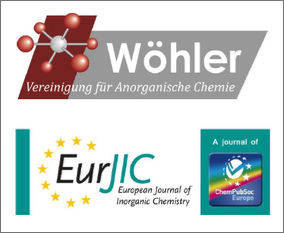 Call for Nominations: EurJIC– Wöhler Young Investigator Prize 2019
Call for Nominations: EurJIC– Wöhler Young Investigator Prize 2019
Nominations are open for the fourth EurJIC–Wöhler Young Investigator Prize, which will be presented at the GDCh-Wissenschaftsforum Chemie in Aachen, September 15–18, 2019.
This award honors a young investigator in the field of Inorganic Chemistry for an excellent scientific publication in which the candidate is a correspondence author.
Click here for more information.
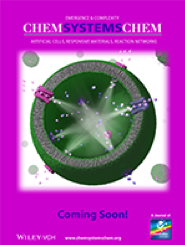 ChemSystemsChem– Your new home for high-impact research in systems chemistry
ChemSystemsChem– Your new home for high-impact research in systems chemistry
ChemSystemsChem(www.chemsystemschem.org) is the latest addition to the ChemPubSoc Europefamily of journals. Itcovers all aspects of emergence and complexity in chemical systems, including artificial cells, responsive materials and reaction networks. Visit the journal homepagefor more information and submit now!
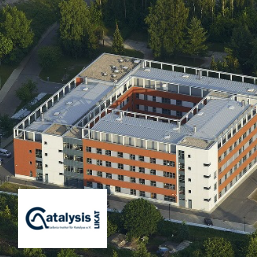 EurJIC and EurJOC: Highlighting LIKAT in Our Recently Introduced Series: European Institute Features
EurJIC and EurJOC: Highlighting LIKAT in Our Recently Introduced Series: European Institute Features
The second top European institute to be featured in this series is the Leibniz-Institut für Katalyse (LIKAT) in Rostock, Germany. EurJICand EurJOCare pleased to bring you a joint virtual issue highlighting the excellent research performed at the institute. The issue is rounded by a Guest Editorial written by the director of the institute, Matthias Beller. Discover more.
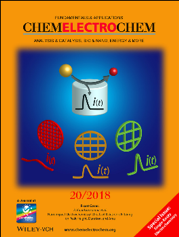 ChemElectroChem: Special Issue on Single-Entity Electrochemistry
ChemElectroChem: Special Issue on Single-Entity Electrochemistry
This growing, exciting, and captivating field is represented by 25 original contributions and focused topical reviews on single‐entity electrochemistry research in this Special Issueof ChemElectroChem, guest-edited by Yi‐Tao Long, Patrick R. Unwin, and Lane A. Baker.
Topics include theoretical and fundamental studies, development of new methods, and analytical assays for various applications.
David Spichiger, SCS
23.10.2018
Page 80 of 305

